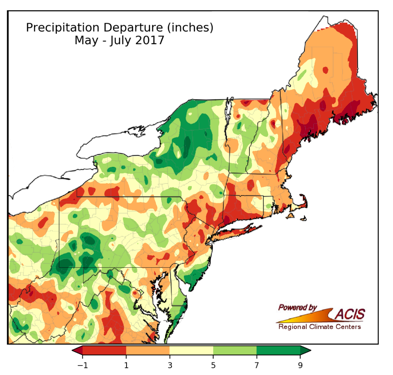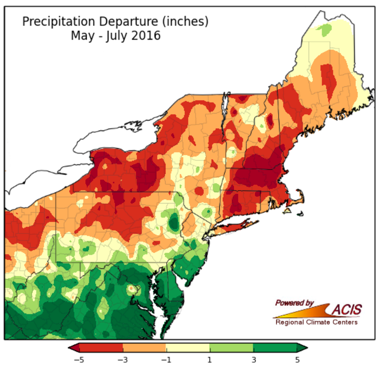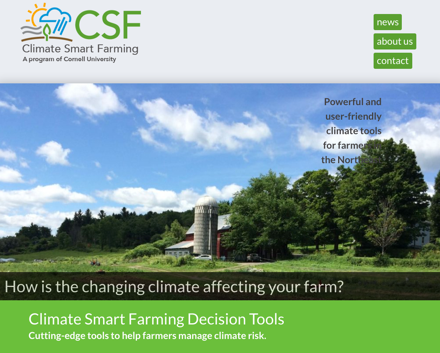2017 has been a very wet year. But you already know that. From May to July, most of upstate New York received at least five inches of rain above normal. But go back to 2016 and the same areas had deficits ranging from one two five inches. That’s a real drag.
Northeast Regional Climate Center. Cornell University
How are you supposed to plan ahead when it seems impossible to predict what will happen? It seems like every growing season is different. What our parents and grandparents knew about weather patterns on the family farm may no longer apply.
‘It’s June and we’re not even in our fields.’
‘I missed the cutoff date for crop insurance.’
The list goes on and on.
The Network for Environment and Weather Applications is a useful resource for fruit and vegetable growers when it comes to understanding how changing weather conditions affect your operation on a daily or weekly basis. For example, online tools such as our apple scab and fire blight models help you understand disease risk and subsequent action steps on a daily basis to protect your apples.
But what about the bigger picture? As growers, how do we even begin to predict management needs in the upcoming season when historical patterns and family knowledge may no longer be as useful? Precipitation, drought, extreme weather, extended growing season and so on are all hitting us at once. Our climate is changing.
Dr. Allison Chatrchyan, director of the Cornell Institute for Climate Smart Solutions has taken steps to explore this ‘big picture’ dilemma by collaborating with Cornell professors Dr. Art DeGaetano and Dr. Toby Ault, as well as regional Cornell Cooperative Extension specialists throughout New York State who form the Climate Smart Farming (CSF) Extension Team.
Climate Smart Farming Team Members
| Laura McDermott | Regional Extension Specialist | Eastern New York Commercial Horticulture Program |
| Dr. Kitty O’Neil | Northern NY Regional Agronomist | North Country Regional Ag Team |
| Dr. Kimberly Morrill | Regional Dairy Specialist | North Country Regional Ag Team |
| Dr. Darcy Telenko | Extension Vegetable Specialist | Cornell Vegetable Program |
Online climate smart decision tools have also been developed to complement the work of CSF Extension Team members. Visit the Cornell Climate Smart Farming website to explore these resources related to agriculture and climate. Where NEWA looks at short-term risks posed by insects and diseases to a crop, the CSF program takes a broader view, providing historical context to current conditions and seasonal trends. By doing so, growers can move in a direction of understanding ways in which fluctuating climate conditions could influence farming operations.
Dr. Chatrchryan provides a great overview of the CSF program in this video. Her talk, Cornell’s Climate Smart Farming Program: Research, Tools, and Extension Support for Farmers in New York and the Northeast, was presented at the 2016 New York State IPM Conference Climate, Weather, Data: Protecting Our Crops and Landscapes. You can also download a PDF of Dr. Chatrchyan’s presentation.
Special thanks to Dr. A. Chatrchyan, L. McDermott, Dr. Kitty O’Neill, Dr. K. Morrill, Dr. D. Telenko, Dr. A. DeGaetano (NRCC) Dr. Toby Ault (EAS) and Dr. M. Hoffmann (CICCS)
—
Dan Olmstead is Coordinator of the New York State IPM program’s Network for Environment and Weather Applications. You can follow him on Twitter (@dolmstead) and Instagram (@dan_olmstead).



